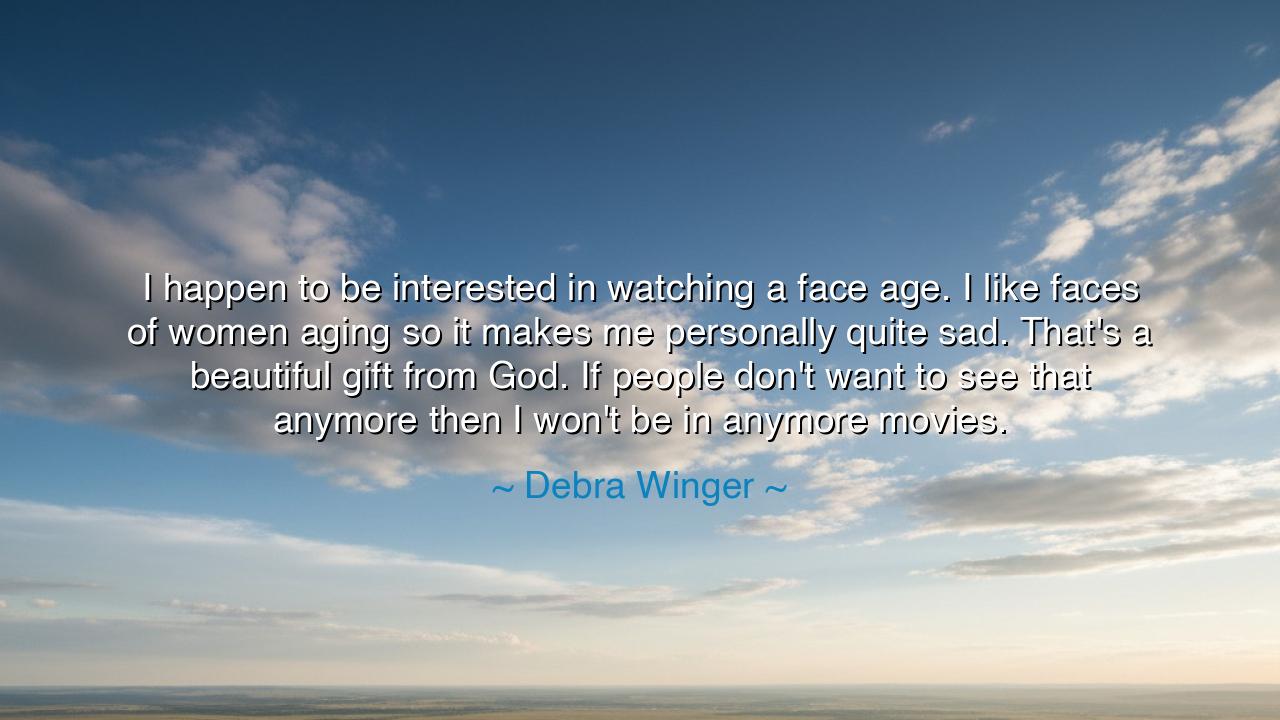
I happen to be interested in watching a face age. I like faces of
I happen to be interested in watching a face age. I like faces of women aging so it makes me personally quite sad. That's a beautiful gift from God. If people don't want to see that anymore then I won't be in anymore movies.






In the deeply human and courageous words of Debra Winger, we find a truth that defies the illusions of our age: “I happen to be interested in watching a face age. I like faces of women aging so it makes me personally quite sad. That's a beautiful gift from God. If people don't want to see that anymore then I won't be in anymore movies.” This statement is more than a lament — it is a quiet rebellion, a defense of authenticity, and a tribute to the sacred beauty of time. In an era where perfection is worshiped and youth is treated as a currency, Winger stands as one who remembers the divine purpose of aging — not as decay, but as revelation.
To watch a face age is to witness the poetry of life itself. Every line carved into the skin is a verse, every wrinkle a record of laughter, tears, endurance, and grace. The ancients revered such faces — the elders whose features bore the wisdom of lived experience. In their lines were maps of memory, testaments to love, struggle, and triumph. Winger’s sadness is not for herself, but for the world’s blindness — a society that has turned its gaze away from the beauty of the real, preferring the unwrinkled mask to the honest face. She mourns not aging itself, but the loss of reverence for it.
In her words lies an ancient echo — the recognition that aging is sacred, a process through which the soul’s light begins to shine through the body’s fading veil. The Greeks saw beauty not merely in symmetry, but in truth revealed by time. The aged face, softened by compassion and experience, becomes a mirror of the eternal. Yet in our modern world, that holiness is often dismissed, concealed beneath paints and procedures. Winger’s refusal to hide, her choice to step away from a culture that denies time’s artistry, is an act of quiet heroism — a declaration that dignity is more radiant than youth.
History remembers many who understood this. The philosopher Sophocles, when asked in his old age what it felt like to grow distant from desire and vanity, replied, “It is as if I have been freed from a savage master.” To age, he implied, is to be liberated from illusion — to see clearly the things that truly matter. In much the same way, Eleanor Roosevelt, once mocked for her plainness, became in later years a symbol of moral beauty that outshone all glamour. Her face aged, but her influence deepened, her wisdom blossomed. Such women remind us that true beauty is not something that fades — it ripens.
What Winger calls a “beautiful gift from God” is this: that our faces change so that our souls may speak more clearly through them. To resist aging is to resist growth. The smoothness of youth may please the eye, but the lines of age speak to the heart. The ancients carved their goddesses and heroes with strength and gravitas, not because they feared age, but because they saw in it the essence of the divine — the strength that comes from endurance, and the serenity that comes from understanding.
Her defiance — “If people don’t want to see that anymore then I won’t be in anymore movies” — is the voice of integrity against conformity. It is the same spirit that drove artists and prophets of every age to stand against their time’s shallowness. In her refusal to be reshaped by expectation, Winger joins the company of those who choose truth over applause. She reminds us that art, at its best, reflects life — and if life itself is denied, art becomes hollow. Her stand is not just for herself, but for every woman told to hide her years, for every human urged to fear their own becoming.
And so, let this be the lesson: cherish the marks that time leaves upon you. Let them be your history, your honor, your light. Do not rush to erase them, for they are proof that you have lived, loved, and endured. See in your reflection not loss, but evolution. Celebrate the beauty of others as they age — for in doing so, you restore reverence to what is real. As Debra Winger teaches through her words and example, the truest art is not eternal youth, but eternal truth, and the most beautiful face is not the untouched one, but the one that tells the story of a soul unafraid to grow old beneath the gaze of time.






AAdministratorAdministrator
Welcome, honored guests. Please leave a comment, we will respond soon